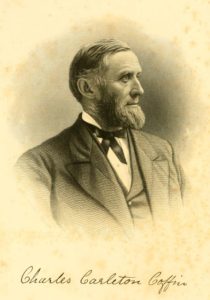From Charles Coffin’s “The History of Boscawen and Webster, from 1733 to 1878”
There is but one municipality in the world bearing the name of Boscawen. The township, thus named for Lord Boscawen of the English Navy, is situated on the west bank of the Merrimack River in New Hampshire. Originally it was seven miles square, and, from the date of its settlement in 1733 to 1760, bore th
The first movement to obtain a history of the town was inaugurated sixty years ago, by Capt. Joshua C. Plummer, Henry Enoch, and Simeon B. Little, and others, at whose solicitation the work was undertaken by Rev. Ebenezer Price, pastor of the Second Congregational Church. George Jackman, born in 1735, town-clerk for many years, was then living, and many other individuals whose memories reached back to the early years of the town’s history, from whom Rev. Mr. Price obtained authentic information to supplement the town records. The result of his labor was the publication of a pamphlet entitled “A Chronological Register of Boscawen, Merrimack County, State of New Hampshire, from the first settlement of the town to 1820.”
The town voted fifty dollars to Rev. Mr. Price as compensation for the writing, but appropriated nothing for publishing the pamphlet, the expense of which was borne by the public-spirited men who started the enterprise, to their pecuniary loss. The history was written with much care, and, though brief, presented an admirable outline of the civil affairs, and a record of the most important events of the period.